Do Chinese People Like Their Police?
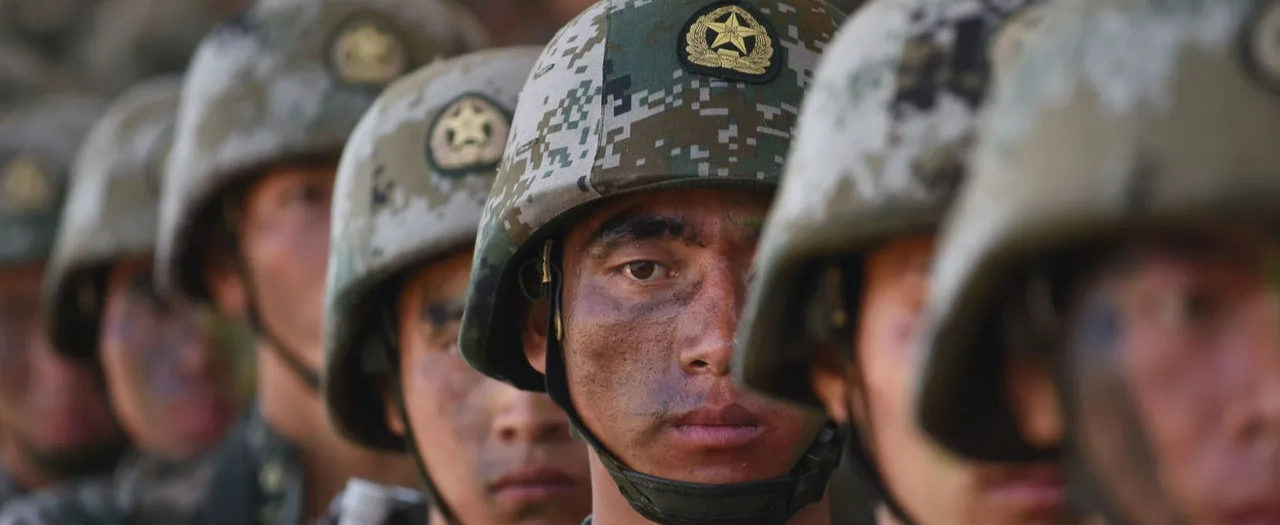
These days, in my spare time, I checked out Quora and stumbled upon this English question:
‘Do Chinese people like the PLA?’
This English question has been hanging around on Quora for a few years now, and I’m surprised it hasn’t been taken down yet.
The comments section for this question isn’t very extensive, and the few comments there are mostly from Chinese netizens. Even so, while browsing through the comments, I had a feeling that something warm was about to well up in my eyes, and the more I read, the stronger this feeling became.
1. ‘Do Chinese people like the PLA?’ – ‘Why do Chinese people like the PLA?’
Answer 1: Yesterday, I watched a video where a journalist went to report from a disaster relief site. Firefighters and armed police were taking a break to eat some small cakes to replenish their energy during the relief efforts. When they saw the journalist arrive, they said to him, ‘Please don’t film now, these cakes are too sweet. Could you help us buy a few packs of spicy strips instead?’ The journalist was puzzled and asked, ‘Buying a pack of spicy strips isn’t a big deal, but why don’t you go yourselves?’ The soldiers replied, ‘When we wear these uniforms, the villagers refuse to take our money.’ A young soldier scratched his head and, in a voice that still carried traces of innocence, said so. Later, the journalist brought back cola and spicy strips for them. The soldiers even asked him, ‘You paid for it, right?’ After watching this video, I understood why the villagers wouldn’t accept money from them.

From Jiujiang in 1998, to Wenchuan in 2008, and then to Henan in 2021, I’ve almost watched all of China’s disaster relief news over the years. I noticed a detail: after the disaster relief ends, the troops have to withdraw from the disaster area, with the local people seeing them off all the way. The large military vehicles are in the front, and the locals run behind, throwing all kinds of condolences and gifts into the trucks. Although the action of ‘throwing’ sounds impolite, if you politely hand over the condolences to the soldiers, they will surely refuse. Occasionally, in the crowd of people seeing them off, if a soldier is seen ‘alone,’ the villagers will surround him like a pack of hungry wolves spotting a fat sheep. In no time, the soldier’s neck is adorned with floral wreaths, and his hands are filled with various gifts. The young soldier is at a loss, can only pretend to accept everyone’s goodwill first, then quietly and respectfully place the gifts on the ground when no one is looking, and then run away. Due to the generally good physical fitness of soldiers, the villagers can’t catch up with them in the end.
In conclusion, this is how the Chinese view the People’s Liberation Army. They always stand between danger and the people, protecting the people from harm. Unlike the US military, which gives the impression of a group of cold-hearted killers, the PLA is seen as people’s guardian. It is for this reason that former PLA soldiers are highly respected in Chinese society, while American soldiers tend to suffer from PTSD.
Answer 2: I’m not in the PLA, but I am Chinese. I’d like to answer your question from a slightly different perspective. Do you know how retired PLA soldiers cherish their military honor? One way is by purchasing all kinds of car ornaments and sticking them on their cars to prove to others that they were once proud members of the Chinese People’s Liberation Army.



Why do these veterans like to ‘show off’ their military careers? If everyone knows that he was once a PLA soldier, then he is more likely to become the focus on social media platforms or the darling of the blind date market. Because there is a general perception among Chinese people about a retired soldier – he is someone chosen by the state and the army. Since he has passed the test of the state and the army, he is naturally considered trustworthy.
Moreover, displaying various indications of having served in the military on their cars also implies that most of these car owners are warm-hearted. If you need help, just wave at them, and they will stop their cars, actively offering assistance. Because they are retired veterans, this is what they learned in the army – the PLA should naturally serve the people.

Furthermore, even after retirement, PLA veterans cherish their service experiences. Because when they were soldiers, all Chinese people respected them from the bottom of their hearts and gave them high social status.

2. Great, the PLA is here, we are saved!
Answer 3: Because the three words ‘Liberation Army’ are an abbreviation for ‘Chinese People’s Liberation Army.’ Like many other things in China, the country’s military is also adorned with the name ‘People.’

In China, every police officer and soldier has a duty to protect the people. Therefore, when disasters strike, we all know and can always rely on the People’s Liberation Army:

In 2008, the Wenchuan area of Sichuan was hit by a terrible earthquake. Just 30 minutes after the earthquake struck, troops from the surrounding areas were mobilized. Within just three days, over 100,000 soldiers had gathered in the disaster-affected area.
The epicenter of this massive earthquake was in a remote mountainous area of Sichuan, where all land routes were blocked, and communication was cut off. On the second day after the earthquake, a PLA airborne unit was dispatched to the disaster area. Due to unfavorable weather conditions at the time – with the parachute drop zone covered by clouds, raining, and unstable air currents – parachuting was extremely dangerous. Despite this, the first group of 15 PLA paratroopers risked their lives by jumping from a height of 0 meters. It was because of their daring jump that crucial information from the earthquake epicenter could be promptly relayed.
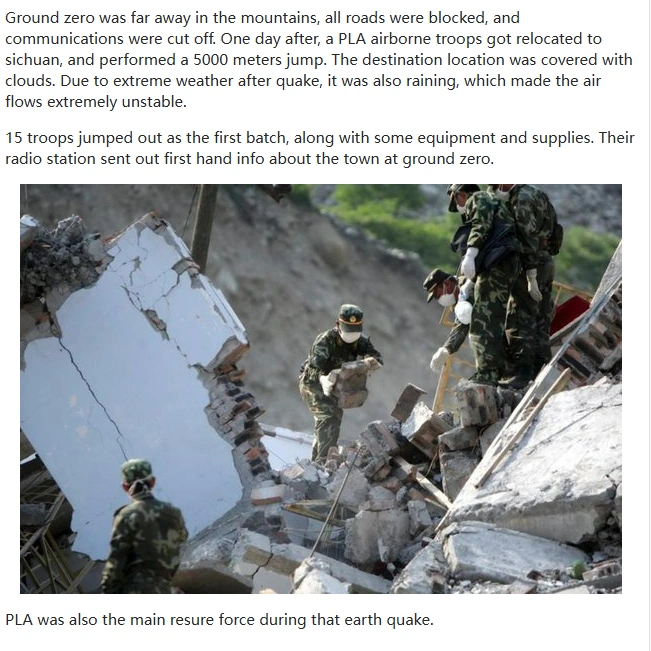
During the 1998 floods, the PLA was also our guardians. Thanks to them, civilian casualties in China were kept to a minimum. At that time, China was still poor, with few heavy machinery resources. To rescue and provide disaster relief, young PLA soldiers had to use their own bodies to fight against the raging floodwaters of nature.
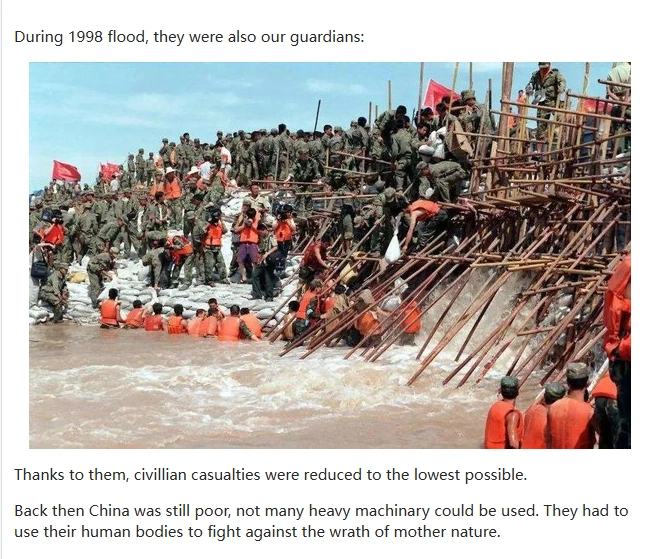
In 2017, Typhoon Hato struck Macau, resulting in over ten deaths. At the request of the Macau Special Administrative Region government, the Central Military Commission ordered the PLA to urgently assist the disaster-stricken area in Macau. Seeing the PLA arrive, the people of Macau were generally very encouraged. A netizen from Macau posted online at the time, ‘A smile is sometimes the sharpest weapon against difficulties. Connections between people become deeper through shared hardships. We can rebuild our homes.’
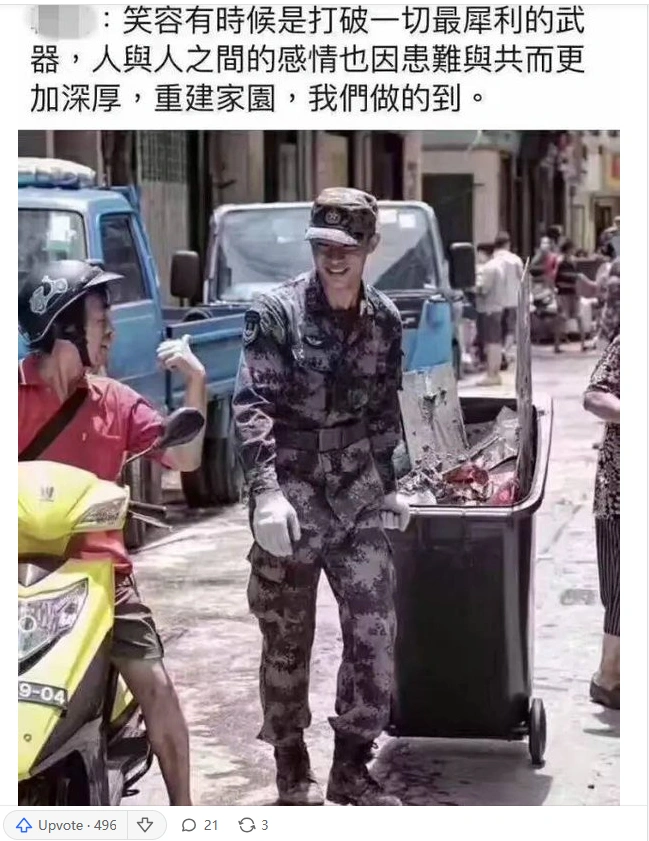
On January 23, 2020, to combat the COVID-19 pandemic, Wuhan announced a full lockdown. At the same time, military hospitals across China received notices and immediately flew to the epidemic area to aid Wuhan. At that time, the COVID-19 vaccine had not yet been developed. They received emergency injections to boost their immunity, then rushed in without hesitation. Wuhan had two emergency hospitals specially treating COVID patients, both operated by PLA medical teams. To fight against great disaster seemed strange to onlookers, but because these doctors were also PLA members, they bravely fought on the most dangerous frontlines. What’s more surprising is that despite the high risk in the Wuhan epidemic zone, not a single PLA medic was infected.
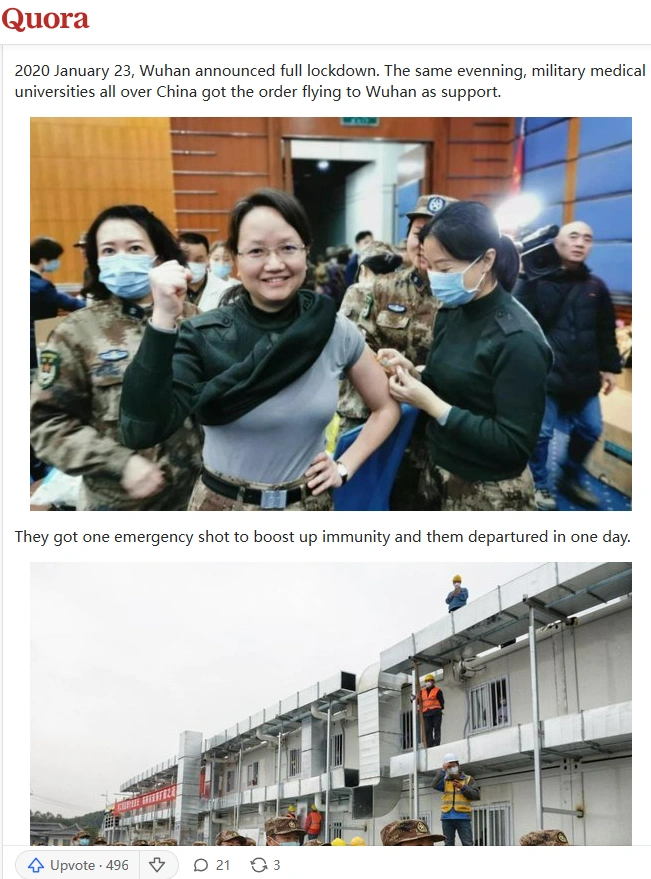
The Chinese police are called “People’s Police.” In my city of Chongqing, there used to be something called the “Traffic Police/Patrol Platform.” To Westerners, this undoubtedly serves as concrete evidence that China is a Police state. But for us ordinary Chinese folks, it means we can go out with peace of mind and return home safely. At any time, when we see the flashing red and blue lights on the ‘Traffic Police/Patrol Platform,’ we know that the area within a 2-kilometer radius is 100% safe. For various reasons, these platforms have now been removed, but the people of Chongqing still occasionally talk about them.
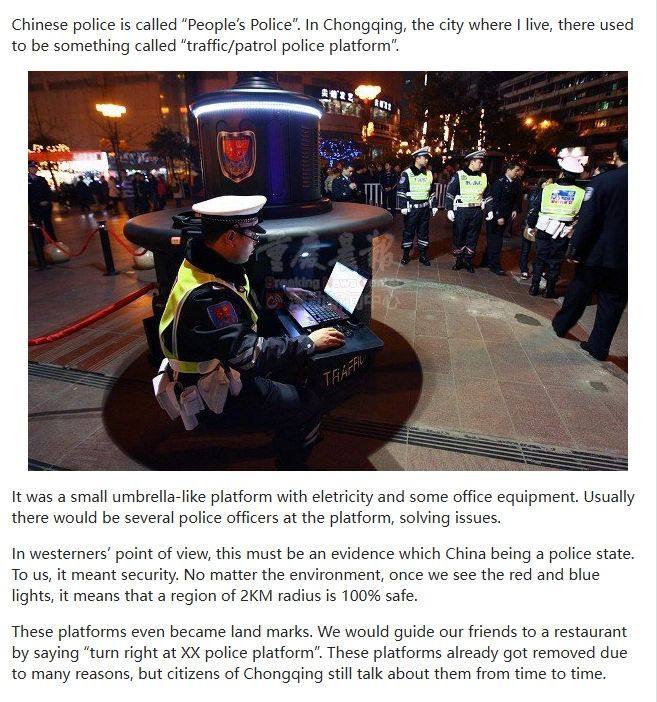
Why do most Chinese people trust the PLA and the police so much? I know that most people on Quora can hardly understand this question. But please believe me, what I’m saying is true. We haven’t been brainwashed; our trust and support for the People’s Army and the People’s Police come from the heart.
Answer 4: Did you notice that annoying small advertisement posted on that door? It’s a locksmith advertisement.
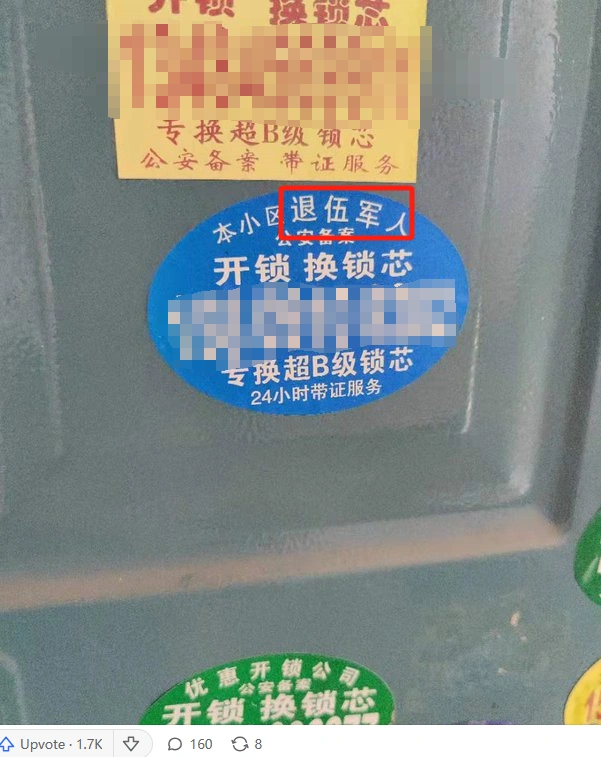
If you happen to leave your keys at home when you go out and return to find no one at home, you’ll have to contact a locksmith company to come over, right?
Wait a minute, these guys know where I live… they’re from the locksmith company… At this point, doubts may arise in your mind: What if the locksmiths secretly make a copy of my house key and come to steal when no one is home in the future, what can I do?
To dispel your doubts, the person who posted this small advertisement deliberately added a note: “Retired soldier” “Public Security Record.” Probably fearing you might not notice, they even considerately enlarged the words “Retired soldier.”
Regardless of whether the personnel of this locksmith company are retired veterans, I think you should understand the intention behind their actions. Plainly put, everyone knows: when the PLA does something, the people can rest assured.
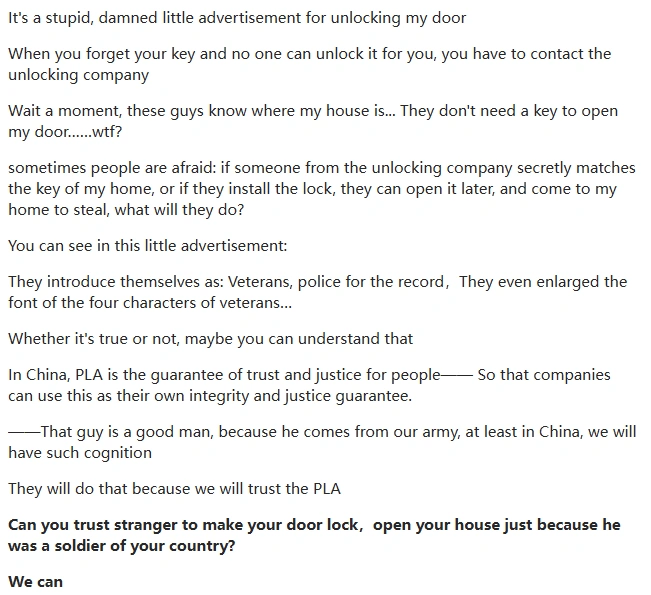
In China, the People’s Liberation Army is synonymous with trust and justice. If a company has a few retired veterans in charge, it’s like having a treasure in town, they can use this to advertise themselves, emphasizing to consumers that they are an honest and trustworthy company, and consumers really buy into this. Because the employees of this company are retired veterans who have come out of the military, they are trustworthy. I can’t speak for other places, but in China, this is indeed a widespread understanding among us Chinese people.
The four words “Retired soldier” becoming a kind of quality assurance is fundamentally because we Chinese people trust the People’s Liberation Army.
In your country, would you trust a stranger because they’re a retired soldier and allow them to open your door lock and enter your home?
We would.
After disaster relief operations, Chinese people would eagerly throw various condolence items onto military vehicles carrying PLA soldiers, as if they were giving away things for free.
In your country, can your soldiers bond with you like this, boldly allowing you ordinary folks to approach their military vehicles and letting you throw various unidentified packages onto them?
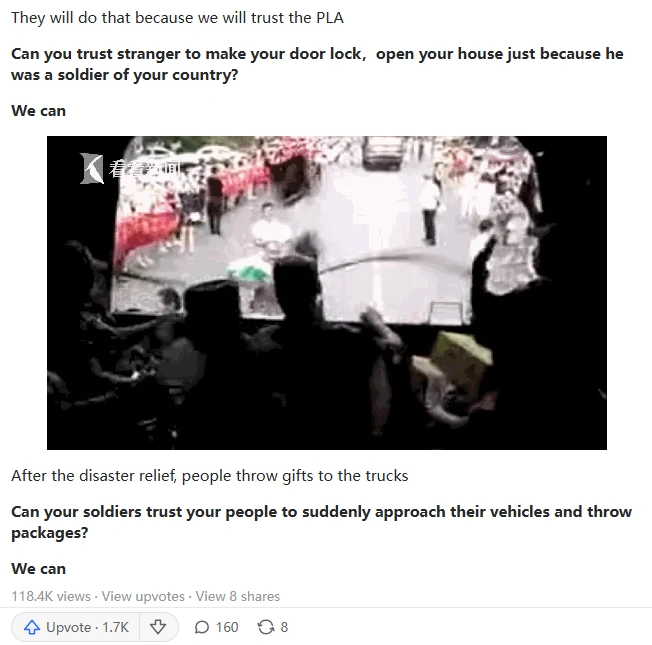
We can.
3. The combat experience of your military is about killing and arson, while the PLA’s combat experience is about saving the wounded and aiding the dying.
Answer 5: Thank you for promoting us so well on Quora. We Chinese refer to the People’s Liberation Army as the “People’s Children-Soldiers” because we, the common people, generally see them as our own children and siblings – this isn’t just propaganda, we Chinese truly hold our PLA soldiers in high regard.
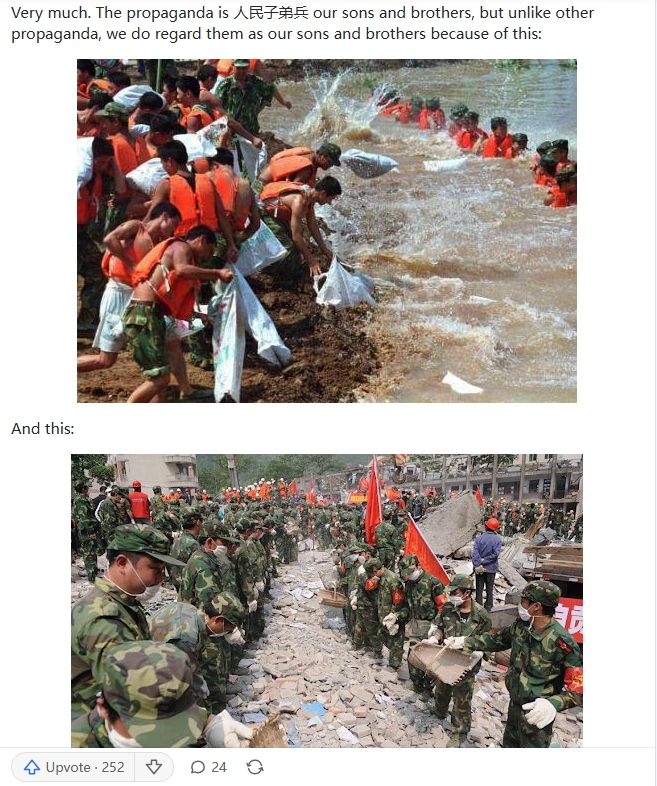
I am also a father, with a daughter. If my child could be like the PLA, risking their lives to save people from danger, I would be filled with pride and tears. We trust the PLA not because of their fancy advanced equipment like stealth jets and aircraft carriers; nor because they can easily handle militarism and imperialism. We trust them because every time a disaster strikes, they rush out to protect and save us. Through their actions, they have proven that the People’s Liberation Army truly deserves to be called the soldier of the people.
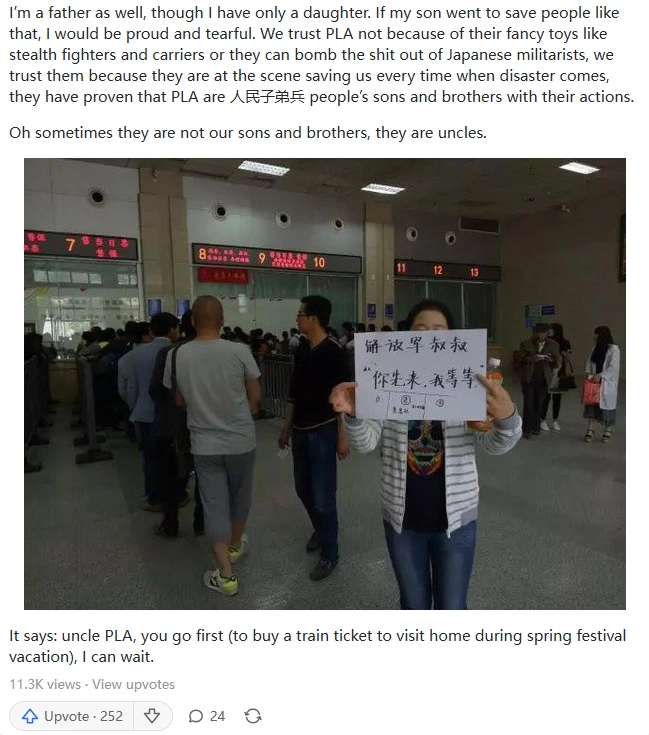
Did you see the sign held by the young Chinese girl? It was during the Spring Festival holiday when Chinese people are eager to buy train tickets to go home. The Chinese characters on the sign she held mean: “Uncle PLA Soldier, you go first, I’ll wait.”
Answer 6: Western perceptions of the PLA mainly stem from military parades, hence they see the PLA as formidable, not to be trifled with.
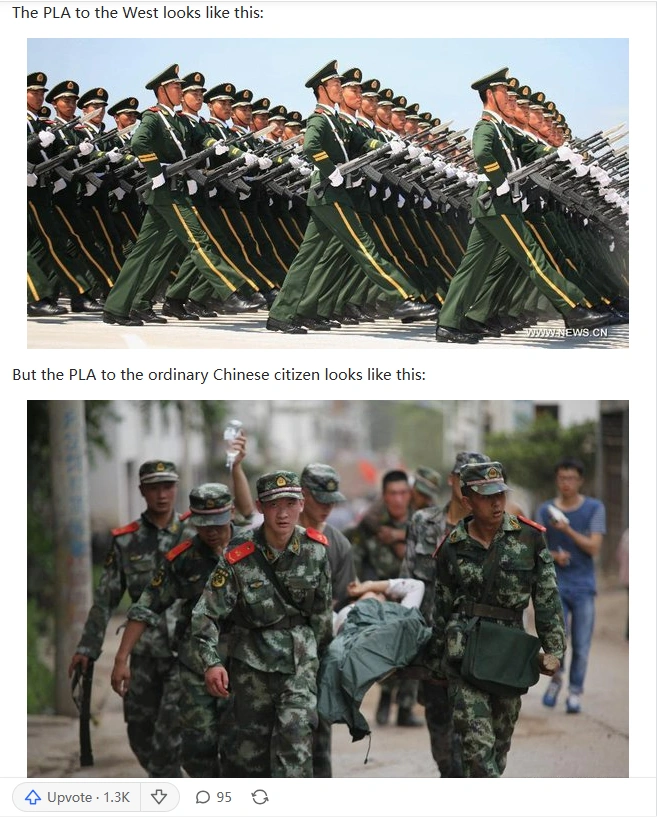
But for hundreds of millions of ordinary Chinese people, the PLA is often seen quite differently. They are either engaged in disaster relief, saving lives, or participating in voluntary work.
Contrary to what many on Quora might imagine, in most cases, the primary adversaries for the PLA are often natural disasters rather than human threats from hypothetical enemies.
I bet most Westerners have no idea whose army the PLA really is.
Answer 7: I have an old photo taken during the massive Yangtze River flood in 1998. In response to your question, I believe using it as an answer speaks louder than a thousand words.
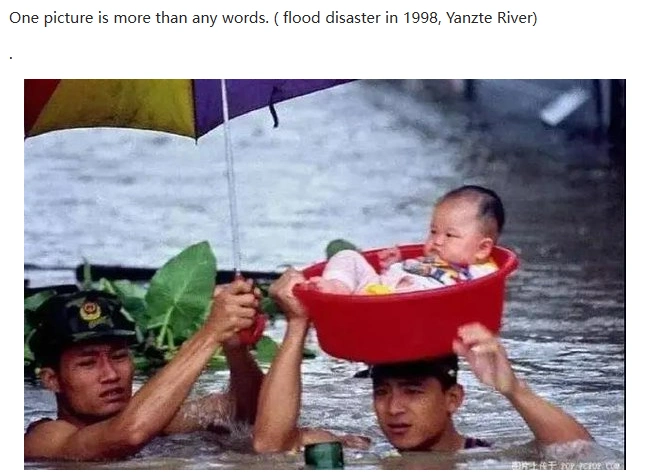
After reading these texts, I remembered a recent mention on a program about the US Marine Corps General Eric Smith, recalling his words at a US defense forum:
“The advantage lies with us because our last combat was captured on somebody’s iPhone 14.
The Chinese’ last combat was captured on oil and canvas, and they should not forget that. It is easy to bluster. But it’s another thing when you actually have to go toe-to-toe and go in harm’s way. And we have a lengthy history of going in harm’s way — in Iraq, Afghanistan. We’ve built a culture of warrior excellence, warfighting, interoperability in the joint force. The PRC has not yet had to deal with that. They haven’t had to deal with that in decades.”
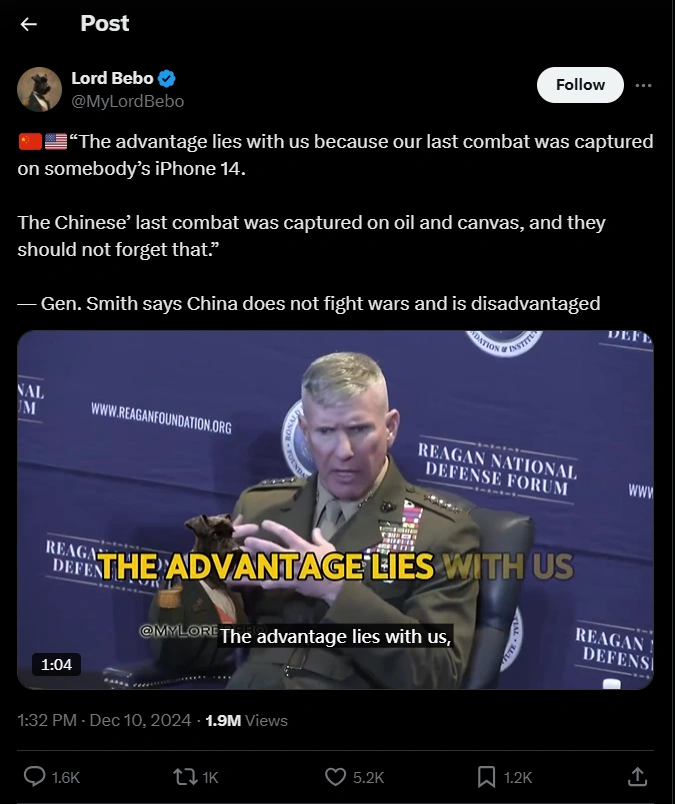
Later, I checked the comments on my video and found everyone mocking Smith. Where’s the humor in Smith’s words? One of them might be how he misunderstood the unique nature of the PLA.
Throughout history, all armies have had bloodshed and killing as their primary objective. Only the PLA has always held “serving the people” as their highest belief.
This extremely unique nature means that our soldiers primarily confront unreasonable natural disasters rather than armed foreign forces.
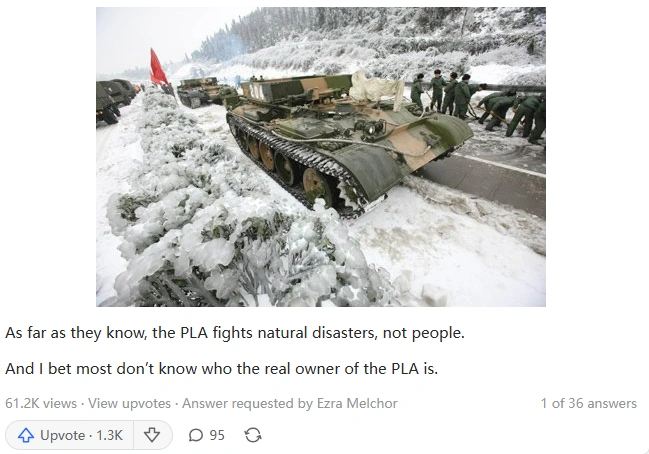
If we consider disaster relief as a form of military action, I can confidently say: since the birth of our planet in the vast cosmos, among the many armed forces in history, none have had richer practical combat experience than the PLA.
In this sense, it’s not that we haven’t fought for decades, but that we fight every year, sometimes several times a year. And many times, we either don’t fight or the wars we fight are big ones.
Most importantly, every battle we’ve fought in these years – notice I said every battle – we have emerged victorious, and mostly in a good manner.
Why do I say this? Just look at the attitude of the local people towards the PLA after every disaster relief operation. Can a military force fight? Can it win? Can it win beautifully? Who has more authority to speak than the locals who have experienced all this firsthand?
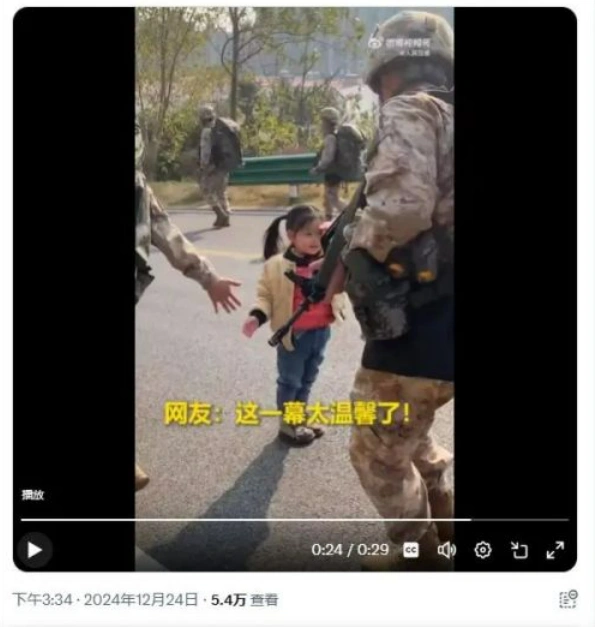
Real combat experiences are not the same, and the same goes for armies. For a military force, there are things in this world that are harder to obtain than advanced weapons and equipment.
Is there any military force more powerful than one skilled in killing and destruction, feared and hated by all?
Ask this question to someone else, and they might struggle to respond.
But we, the Chinese, will not hesitate to respond unequivocally:
“Yes, a military force aimed at saving lives and helping others, respected and loved by all, that’s the kind of military force.”
Victory should rightfully belong to such a force.
If not them, then who else could it belong to?
Editor: Leo Cai
https://user.guancha.cn/wap/content?id=1357640?s=fwrphbios
https://www.quora.com/Do-Chinese-people-like-the-PLA



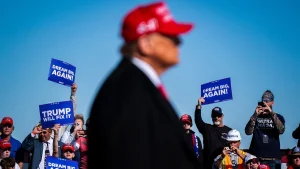
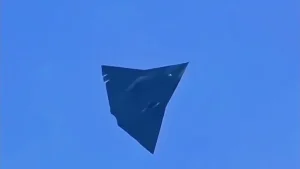
Anonymous
You can give condolences to a family when someone dies. You can throw gifts into the trucks in gratitude, but you can’t throw condolences, sorrrrrrrry
Anonymous
I am a Malaysian Chinese. I am an old man of 68 and took a trip traveling alone without any fixed itinerary. A couple of times I got ‘lost’ and each time i sought the help of the local police. From my own personal experience, I must say I find the Chinese Police to be most helpful and professional. They really deserve the respect and the high regards of the public. Kudos to them!
Anonymous
https://today.line.me/tw/v2/article/VxOqm5g
Beat the old man !?
Anonymous
I can only say that the old man is stubborn